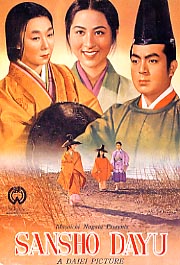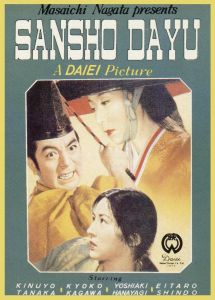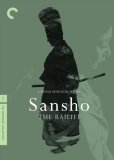| Reviews & Columns |
|
Reviews DVD TV on DVD Blu-ray 4K UHD International DVDs In Theaters Reviews by Studio Video Games Features Collector Series DVDs Easter Egg Database Interviews DVD Talk Radio Feature Articles Columns Anime Talk DVD Savant Horror DVDs The M.O.D. Squad Art House HD Talk Silent DVD
|
DVD Talk Forum |
|
|
| Resources |
|
DVD Price Search Customer Service #'s RCE Info Links |
|
Columns
|
|
|
Sansho the Bailiff - Criterion Collection
In Kaneto Shindo's remarkable documentary Kenji Mizoguchi: The Life of a Film Director (included as an extra feature on Criterion's Ugetsu), it's revealed that toward the end of his life Mizoguchi dearly coveted international recognition for his work, and that by the mid-1950s - when Japanese cinema was just beginning to find an enthusiastic audience abroad - he was only too eager to cater to the demands of Masaichi Nagata, the head of Daiei Studios. Nagata had recently acquired a taste for international recognition himself, having rather infamously hogged all the credit for Akira Kurosawa's Rashomon (1950), a film Nagata reportedly hated and disowned until it started winning awards.
Nonetheless, Rashomon established a precedent in the minds of American audiences and critics. Having little to compare it with, many assumed all Japanese movies were, in terms of content and style, probably a lot like Rashomon, while in Japan Nagata and the other studio heads came to the conclusion that if the exoticism and a period setting and costumes of Rashomon were what western audiences wanted, that was what they were going to give them. As a result, the burgeoning international divisions of Daiei, Toho, and others began pushing their stately, big-scale period films, often Classics Illustrated-style adaptations of folk stories and legends, movies that leaned heavily on Asian exoticisms: extravagant kimono, shamisen-laced scores, and lots of jidai-geki pageantry.
Mizoguchi made Ugetsu, of course, and later on A Story from Chikamatsu (Chikamatsu monogatari, 1954), another archly tasteful period adaptation, and two quite bad color films, Princess Yang Kwei Fei (Yokihi), and New Tales of the Taira Clan (Shin heike monogatari, both 1955). These pictures offered great photography, fine performances, beautiful costumes...and little else.
Ironically, two of among the director's finest-ever works, A Geisha (Gion bayashi, 1953) and Mizoguchi's last, Street of Shame (Akasen chitai, 1956), received almost no attention abroad. These films had postwar settings and thus, it was perceived, of little interest to foreign audiences. Nonetheless, both films play to Mizoguchi's greatest strength - that is, character portraits of geisha and geisha-class women all too often at the mercy of men, a subject Mizoguchi's had been intimately acquainted ever since his eldest sister was sold to a geisha house when he was a boy.
Unquestionably, Sansho the Bailiff is an exquisite production. Kazuo Miyagawa's cinematography is subtle and poetic. The score, one of the last composed by a dying Fumio Hayasaka (Seven Samurai), is lovely. And the performances, especially by the always luminous Kinuyo Tanaka, are utterly convincing.
And yet there's a certain detachment watching Sansho's two-hour misery matsuri ("festival"). Though its story of the loyal wife (Tanaka) and two children (played as adults by Kyoko Kagawa and Yoshiaki Hanayagi) of a deposed, righteous governor and their long fall into slavery and prostitution has a visceral, emotional honesty common to all of Mizoguchi's best work, and though presented as a folk tale/morality play about the struggle for humanism in a mercilessly cruel world (as the father says near the beginning, plainly stating the film's blunt message, "Without mercy, man is a beast"), the message-on-its-sleeve bleating of its theme is front-and-center at the expense of all else. It's like watching a two-hour beating, with Greek Chorus characters standing around, shaking with anger exclaiming, "What a horrible world!" (which is exactly what one character does).
Video & Audio
Criterion's DVD, however, can't be faulted. Compared to other 1954-era Japanese films, Sansho the Bailiff is in remarkably good shape, very clean, and the transfer brings the most out of Miyagawa's stunning cinematography. The image is very slightly windowboxed, but nowhere near to the extreme of other (highly criticized) Criterion titles of the past year or so. The mono audio is likewise very good, and the subtitles are excellent.
Extra Features
Handsomely packaged, the DVD of Sansho the Bailiff is accompanied by an 80-page book that includes two stories from which the film was derived: Sansho the Steward by Ogai Mori, and An Account of the Life of the Deity of Mount Iwaki. Also included is a cast/crew list (not complete, but better than usual for Criterion) and a good essay by Mark Le Fanu, "The Lessons of Sansho."
Jeffrey Angles provides an informed, mostly literary-reading audio commentary, while esteemed Japanese film critic Tadao Sato, actress Kyoko Kagawa (The Bad Sleep Well, Mother), and the film's first assistant director, Tokuzo Tanaka (who later directed numerous Hoodlum Soldier and Zatoichi movies starring Shintaro Katsu) all appear in 16:9 widescreen interviews.
Parting Thoughts
Sansho the Bailiff is a fine film in spite of its over-eagerness to please overseas critics with its Japanese painting-like imagery; it's certainly among the most handsome Japanese productions of the 1950s. There are a good dozen Mizoguchi films superior to it, however, despite its half-century-long reputation, though on its own terms it's still a remarkable work on many levels. Highly Recommended.
Film historian Stuart Galbraith IV's most recent essays appear in Criterion's new three-disc Seven Samurai DVD and BCI Eclipse's The Quiet Duel. His audio commentary for Invasion of Astro Monster is due out in June.
|
| Popular Reviews |
| Sponsored Links |
|
|
| Sponsored Links |
|
|
| Release List | Reviews | Shop | Newsletter | Forum | DVD Giveaways | Blu-Ray | Advertise |
|
Copyright 2024 DVDTalk.com All Rights Reserved. Legal Info, Privacy Policy, Terms of Use,
Manage Preferences,
Your Privacy Choices | |||||||















